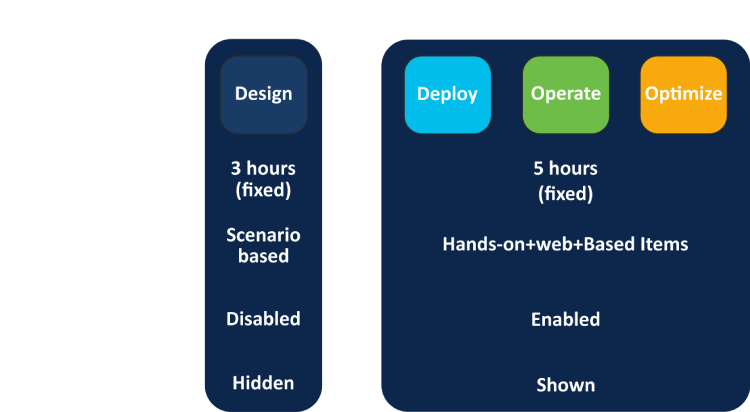Key Features

Training Mode
Classroom and Online

Learning Method
Lecture & Self-Study

Lecture & Self-Study
1 Month

Training Hours
3 Hours per day

Hands on Labs
Yes

Study Material
Yes

Certificate
Yes

Batches
(Mon-Thu) & (Sat-Sun)
CCIE Collaboration Course Overview
Achieving CCIE Collaboration certification proves your skills with complex collaboration solutions. To earn CCIE Collaboration certification, you pass two exams: a qualifying exam that covers core collaboration technologies, and a hands-on lab exam that covers enterprise collaboration solutions through the entire network lifecycle, from designing and deploying to operating and optimizing.
- Sr. Collaboration engineer
- Lead Consultant UC
- Sr. Collaboration administrators
- Technical Solutions Architect
There are no formal prerequisites for CCIE Collaboration, but you should have a thorough understanding of the exam topics before taking the exam.
CCIE candidates are recommended to have five to seven years of experience with designing, deploying, operating and optimizing enterprise networking technologies and solutions prior to taking the exam
Working knowledge of fundamental terms of computer networking, including LANs, WANs, switching, and routing
Basics of digital interfaces, Public Switched Telephone Networks (PSTNs), and Voice over IP (VoIP)
Fundamental knowledge of converged voice and data networks and Cisco Unified Communications Manager deployment
All Cisco certifications are valid for 3 years.
Pass a qualifying exam
CCIE Collaboration Syllabus
Implementing and Administering CCIE Collaboration Course
- 2 month of Instructor-led classroom training
- 2 month of Virtual instructor-led group online training
- 25 days of 1-on-1 training (It saves your time as you get a personal trainer for the entire duration of the boot camp.)
Who are eligible for this course ?
- Network engineers with Core exam – Implementing Cisco Collaboration Core Technologies (CLCOR 350-801) This is the CCIE Collaboration written exam which is valid as a qualifying exam for CCIE Collaboration lab exam v3.0
- Network engineer with at least five to seven years of professional experience with designing, deploying, operating and optimizing Cisco Collaboration technologies
- Network engineers need to use an expert-level problem-solving process that includes options analysis to support complex collaboration technologies and topologies
- Network designers that design and support complex collaboration technologies and topologies
- Students and professionals in the IT and Technologies sector who wish to enhance their knowledge and acquire an internationally recognized professional certification which can improve their job prospects
Course Outline
CCNP Enterprise training has been designed & developed adhering to latest Cisco Blueprint and includes all modules of CCNP Enterprise Exam
350-401 – Implementing and Operating Cisco Enterprise Core Technologies ENCOR
Test your knowledge of core enterprise network technologies and take another step towards your CCNP Enterprise certification.
300-410 – Implementing Cisco Enterprise Advanced Routing and Services (ENARSI)
The Implementing Cisco Enterprise Advanced Routing and Services (ENARSI) v1.0 gives you the knowledge you need to install, configure, operate, and troubleshoot an enterprise network. This course covers advanced routing and infrastructure technologies, expanding on the topics covered in the Implementing and Operating Cisco Enterprise Network Core Technologies (ENCOR)v1.0 course.
This course helps prepare you to take the exam, 300-410 Implementing Cisco® Enterprise Advanced Routing and Services (ENARSI), which leads to the CCNP® Enterprise and Cisco Certified Specialist – Enterprise Advanced Infrastructure Implementation certifications. This course also earns you 40 Continuing Education (CE) credits towards recertification.
300-415 – Implementing Cisco SD-WAN Solutions (SDWAN)
The Implementing Cisco SD-WAN Solutions (ENSDWI) v2.0 course trains you to design, deploy, configure, and manage your Cisco® Software-Defined WAN (SD-WAN) solution in a large-scale live network, including how to migrate from legacy WAN to SD-WAN. You will learn best practices for configuring routing protocols in the data center and the branch, as well as how to implement advanced control, data, and application-aware policies. The course also covers SD-WAN deployment and migration options, placement of controllers, how to deploy WAN Edge devices, and how to configure Direct Internet Access (DIA) breakout. The course examines the different Cisco SD-WAN security options available, such as application-aware enterprise firewall, Intrusion Prevention System (IPS), URL filtering, Cisco Advanced Malware Protection (AMP), Secure Sockets Layer/Transport Layer Security (SSL/TLS) proxy, and Cisco Umbrella® Secure Internet Gateway (SIG).
300-430 – Implementing Cisco Enterprise Wireless Networks (ENWLSI)
The Implementing Cisco Enterprise Wireless Networks (ENWLSI) v1.1 course gives you the knowledge and skills needed to create a secure wireless network infrastructure and troubleshoot any related issues. You’ll learn how to implement and fortify a wireless network infrastructure using Cisco Identity Service Engine (ISE), Cisco Prime Infrastructure (PI), and Cisco Connect Mobile Experience to monitor and troubleshoot network issues.
This course provides hands-on labs to reinforce concepts including deploying Cisco Prime Infrastructure Release 3.5, Cisco Catalyst® 9800 Wireless Controller Release, Cisco IOS XE Gibraltar 16.10, Cisco Digital Network Architecture (Cisco DNA) Center Release 1.2.8, Cisco Connected Mobile Experiences (CMX) Release 10.5, Cisco Mobility Services Engine (MSE) Release 8.0 features, and Cisco ISE Release 2.4.
This course also helps you prepare to take the 300-430 Implementing Cisco Enterprise Wireless Networks (ENWLSI) exam, which is part of the CCNP® Enterprise certification and the Cisco Certified Specialist – Enterprise Wireless Implementationcertification. This course also earns you 40 Continuing Education (CE) credits towards recertification.
300-420 – Designing Cisco Enterprise Networks (ENSLD)
The Designing Cisco Enterprise Networks (ENSLD) v1.1 course gives you the knowledge and skills you need to design an enterprise network. This course serves as a deep dive into enterprise network design and expands on the topics covered in the Implementing and Operating Cisco® Enterprise Network Core Technologies (ENCOR) v1.0 course. This course also helps you prepare to take the 300-420 Designing Cisco Enterprise Networks (ENSLD) exam which is part of the CCNP® Enterprise and Cisco Certified Specialist – Enterprise Design certifications. This course also earns you 40 Continuing Education (CE) credits towards recertification.
300-425 – Designing Cisco Enterprise Wireless Networks (ENWLSD)
The Designing Cisco Enterprise Wireless Networks (ENWLSD) v1.1 course gives you the knowledge you need to design Cisco® wireless networks. The course covers design specifics from scenario design concepts through the installation phase and into post-deployment validation. This course, including the self-paced material, helps prepare you to take the exam, Designing Cisco Enterprise Wireless Networks (300-425 ENWLSD), which leads to to the CCNP® Enterprise and Cisco Certified Specialist – Enterprise Wireless Design certifications. This course also earns you 40 Continuing Education (CE) credits towards recertification.
300-435 – Implementing Automation for Cisco Enterprise Solutions (ENAUI)
Implementing Automation for Cisco Enterprise Solutions (ENAUI) v.1.2 teaches you how to implement Cisco Enterprise automated solutions, including programming concepts, orchestration, telemetry, and automation tools. This course highlights the tools and the benefits of leveraging programmability and automation in the Cisco-powered Enterprise Campus and WAN. You will also examine platforms including IOS XE software for device-centric automation, Cisco DNA Center for the intent-based enterprise network, Cisco Software-Defined WAN, and Cisco Meraki. Their current ecosystem of APIs, software development toolkits, and relevant workflows are studied in detail together with open industry standards, tools, and APIs, such as Python, Ansible, Git, JSON/YAML, NETCONF/RESTCONF, and YANG. This course also earns you 24 Continuing Education (CE) credits towards recertification.
Our CCNP Enterprise Training program provides the students with opportunity to have hands-on labs on Real Cisco Devices which boost their Confidence at handling these devices and tools efficiently in enterprise networks.
- Router: ISR 1841, 1905, 2811, 2911
- Switches: 2950, 2960, 3750, 3560 Poe Switch
- Tools: Cisco IOS , Putty, GNS and Cisco Packet Tracer, IDLE Tool for python scripting
- Network administrators
- Enterprise network engineers
- System engineers
- System administrators
- Wireless network engineers
We are 100% committed to offer placement assistance to our students. Industry approved Resume Templates are provided to candidates as guidance to assist them in writing their resumes. We also provide students with FAQ interview questionnaire to help them prepare for their job interviews.
On an average a CCNP Enterprise Certified Engineer with 2-3 years of experience gets salary in the range of INR 30,000 to 50,000 per month in India.
Learning never stops. We always recommend CCIE Enterprise Infrastructure (Course link) or CCIE Enterprise Wireless(Course link). There is huge demand for CCIE Enterprise Engineers in market. These training and certification will establish your authority as an industry expert and provide you better career opportunities in the market.
- Using CA Certificates for UC Applications
- Configure IP Network Protocols
- Implement SIP Early Offer and Delayed Offer Calls
- Configure Early Media for SIP Calls
- Troubleshooting Session Timers for SIP Calls
- Configure and Troubleshoot Collaboration Endpoints
- Troubleshoot Calling Issues
- Configure and Troubleshoot LDAP Integration in Cisco Unified Communications Manager
- Implement Call Admission Control
- Understanding Location Based Call Admission Control
- Implementing Enhanced Location Based Call Admission Control
- Implement Endpoint Addressing and Call Routing
- Examine Cisco IOS Gateway Inbound and Outbound Dial-Peer Functions
- Implement and Troubleshoot Digit Manipulation on a Cisco IOS Gateway
- Implement Globalized Call Routing
- Deploy an On-Premise Cisco Jabber Client for Windows
- Configure the Integration Between Unity Connection and Cisco UCM
- Manage Unity Connection Users
- Integrate and Set Up Cisco Unity Connection
- Implement Cisco Jabber
- Configure Centralized Cisco Unified Communications Manager IM and Presence
- Troubleshoot SIP and Media Protocols
- Configure Cisco Unified Communications Manager Extension Mobility
- Implement a URI-Based Dial Plan for Multisite Deployments
- Troubleshoot Globalized Call Routing
- Implement Global Dial Plan Replication
- Implement Cisco Unified Border Element
- Configure Cisco Unified Communications Manager to Connect with Cisco Expressway-C
- Configure MRA on the Cisco Expressway Series
- Configure the Initial Collaboration Lab Environment
- Verify Phone Details
- Configure Phone Line Label
- Configure User Pin
- Configure System Forward No Answer Timer
- Configure Route Plan Report
- Configure Voicemail Pin
- Configure SCCP and SIP Integration between Unified CM and Cisco Unity Connection
- Configure Jabber Endpoint using AXL and Postman API
- Configure Partition and CSS using AXL and Postman API
- Configure WebRTC, Ad-Hoc Conferencing and CMS Recording
- Understanding and Configuring A Records and SRV Records on Microsoft DNS
- Certificate Signage from Microsoft CA server via Web Enrollment
- CUBE Box-to-Box Redundancy on Cisco ISR 1000v
- Analyze and troubleshoot SIP Call LogS
What to expect in the lab exam?
The 8 hours practical exam will assess candidate’s skills through the entire network lifecycle of designing, deploying, operating and optimizing complex network scenarios. The exam consists out of 2 modules that are fixed in time and will be delivered in a fixed sequence:
The goal of this module is to measure ability to create, analyze, validate and optimize network designs, which is the base for all deployment activities. Candidates will need to:
- Understand capabilities of different technologies, solutions and services
- Translate customer requirements into solutions
- Assess readiness to support proposed solutions
The module is scenario-based, without access to any devices. Candidates will be provided with a set of documentation required to discern before answering web-based items.
Examples of documentation include email threads, high-level design, network topology diagrams, customer requirements and restrictions, etc. Examples of web-based items include Drag-and-Drop, Multiple-Choice-Single-Answer, Multiple-Choice-Multiple-Answer, Dropdown items, etc.
During this module backward navigation will be disabled. As such, candidates will not have full visibility on all questions within this module. Points value(s) associated to each item are not displayed within this module.
Module 2: Deploy, Operate and Optimize (5 hours)

What devices are used during practice?
The practical exam tests candidates on solutions that can be configured using the below Equipment and software versions. Candidates may see more recent software versions during their attempt but will only be tested on features that are supported in the list below.
Passing the exam requires a depth of understanding difficult to obtain without hands-on experience. Early in your preparation you should arrange access to equipment and software similar to that used on the exam.
- Cisco Unified Communications Manager 12.5.1
- Cisco Unified IM & Presence 12.5.1
- Cisco Unity Connection 12.5.1
- Cisco Meeting Server 2.5.4
- Cisco Meeting Management 2.5.4
- Cisco Unified Contact Center Express 12.0.1
- Cisco Expressway Series 12.5.4
- CSR1000v: IOS XE 16.6.6
- Active Directory: Windows Server 2016
- Test PC: Windows 10
- Cisco Jabber for Windows 12.5.1
Do you provide Placement Assistance, post completion of the training?
We are 100% committed to offer placement assistance to our students. Industry approved Resume Templates are provided to candidates as guidance to assist them in writing their resumes. We also provide students with FAQ interview questionnaire to help them prepare for their job interviews
What is expected salary after the CCIE Collaboration Training Course?
On an average a CCIE Collaboration Certified Engineer with 5 plus years of experience gets salary in the range of INR 1,00,000 (1 Lac) per month in India.
After CCIE Collaboration training course, what is the Next Step?
Learning never stops. We always recommend CCIE Security v6.0 (Course link) training. There is huge demand for CCIE Collaborationcertified Engineers in market. These training and certification will establish your authority as an industry expert and provide you better career opportunities in the market
Course Objectives
The Implementing and Operating Cisco Collaboration Core Technologies (CLCOR) v1.1 course helps you prepare for advanced-level roles focused on implementation and operation of Cisco collaboration solutions.
You will gain the knowledge and skills needed to implement and deploy core collaboration and networking technologies, including infrastructure and design, protocols, codecs, and endpoints, Cisco Internetwork Operating System (IOS) XE gateway and media resources, call control, Quality of Service (QoS), and additional Cisco collaboration applications.
This course helps prepare you to take the Implementing and Operating Cisco Collaboration Core Technologies (350-801 CLCOR) exam. After you pass this exam, you earn Cisco Certified Specialist – Collaboration Core certification and satisfy the core requirement for the CCNP Collaboration and CCIE Collaboration certifications.
This course will help you:
- Describe the Cisco Collaboration solutions architecture
- Compare the IP Phone signaling protocols of Session Initiation Protocol (SIP), H323, Media Gateway Control Protocol (MGCP), and Skinny Client Control Protocol (SCCP)
- Integrate and troubleshoot Cisco Unified Communications Manager with LDAP for user synchronization and user authentication
- Implement Cisco Unified Communications Manager provisioning features
- Describe the different codecs and how they are used to transform analogue voice into digital streams
- Describe a dial plan, and explain call routing in Cisco Unified Communications Manager
- Implement Public Switched Telephone Network (PSTN) access using MGCP gateways
- Implement a Cisco gateway for PSTN access
- Configure calling privileges in Cisco Unified Communications Manager
- Implement toll fraud prevention
- Implement globalized call routing within a Cisco Unified Communications Manager cluster
- Implement and troubleshoot media resources in Cisco Unified Communications Manager
- Describe Cisco Instant Messaging and Presence, including call flows and protocols
- Describe and configure endpoints and commonly required features
- Configure and troubleshoot Cisco Unity Connection integration
- Configure and troubleshoot Cisco Unity Connection call handlers
- Describe how Mobile Remote Access (MRA) is used to allow endpoints to work from outside the company
- Analyze traffic patterns and quality issues in converged IP networks supporting voice, video, and data traffic
- Define QoS and its models
- Implement classification and marking
- Configure classification and marking options on Cisco Catalyst switches

Training Outline
- Describe the call setup and teardown process for a SIP device including codec negotiation using Session Description Protocol (SDP) and media channel setup
- Integrating Cisco Unified Communications Manager IM and Presence and Cisco Jabber
- Understanding & Implementing Cisco Meeting Server Deployment Models and their Core Components.
- How to enable Recording on Cisco Meeting Server
- CUCM Provisioning Interfaces: Administrative XML Interface (AXL) & Using AXL and Soap Methods for Provisioning Unified CM.
- Implement Cisco Collaboration automated, programmable solutions for voice, video, collaboration, and conferencing on-premises
- Implement Globalized Call Routing & Global Dial Plan Replication
- Cisco Extension Mobility such as Single Number Reach and Mobile Voice Access.
- Session Initiation Protocol Uniform Resource Identifier (SIP/ URI) call routing & Call Admission Control
- Cisco Unified Board Element Call deployments, signaling and media protocols, call coverage, and time of day routing
- Implement and deploy core collaboration and networking technologies, including infrastructure and design, protocols, codecs, and endpoints.
- Implement and deploy Cisco Internetwork Operating System (IOS) XE gateway and media resources, call control, Quality of Service (QoS), and additional Cisco collaboration application
- How to enable Cisco Mobile, remote access, authentication options, and additional Cisco Expressway Series features
- How to leverage collaborative technology to access secure, collaborative work supports including video, voice, content, and remote workloads
- Implement Cisco Unified IM and Presence, Cisco Unity Connection
- Troubleshooting ILS/GDPR Call Routing Issues on CUCM
- Troubleshooting SIP Media Negotiation Issues
- Troubleshoot on-Premises Jabber Login Issues
- Troubleshoot MRA Jabber Login Issues
- Troubleshoot Unity Connection VM Issues
- Troubleshoot WebRTC Login
- Troubleshoot URI Dialing
- Troubleshoot CUCM DB Replication Issues
- Best Design Practices and Recommendation for CUCM
- CUCM Upgrade and Migration
- Design Recommendation for Expressway
- CMS Deployment Model
- Design for Unity Connection Cluster
- On-Premises Cisco IM and Presence Service Cluster
- On-Premises Cisco IM and Presence Service High Availability & Deployment Model
Exam & Training
| Exam Name | Exam Code | Duration | Cost | Registration |
| CCIE Collaboration v3.0 | – | 8 Hours | 1600 USD | CCIE Portal |
Training Plan & Schedule
Classroom
| Date | Course | Batch | Register |
| 05 December 2022 | CCIE Collaboration | Weekdays (Mon-Fri) | Enquire now |
| 11 December 2022 | CCIE Collaboration | Weekend (Sat-Sun) | Enquire now |
| 19 December 2022 | CCIE Collaboration | Weekdays (Mon-Fri) | Enquire now |
| 25 December 2022 | CCIE Collaboration | Weekend (Sat-Sun) | Enquire now |
Virtual Classroom
| Date | Course | Batch | Register |
| 05 December 2022 | CCIE Collaboration | Weekdays (Mon-Fri) | Enquire now |
| 11 December 2022 | CCIE Collaboration | Weekend (Sat-Sun) | Enquire now |
| 19 December 2022 | CCIE Collaboration | Weekdays (Mon-Fri) | Enquire now |
| 25 December 2022 | CCIE Collaboration | Weekend (Sat-Sun) | Enquire now |
CCIE Collaboration Students

CCIE EI #66320

CCIE EI #26059

CCIE EI #66999

CCIE EI #51924

CCIE EI #50138

CCIE #50724

CCIE #49847
Start your CCNA journey
Review
Use the exam topics to evaluate what you already know, identify areas of focus, and build your
study plan.
Study and train
Once you know which topics your exam will cover, choose a study or training option that works
for you.
Practice
Practice with our labs, simulation tools.
Assess
Test your readiness with official CCNA practice questions.
Schedule test
Schedule to take your CCNA exam online or at a Pearson VUE location available worldwide.
Certify
Log in to the Certification Tracking System to see your updated status and claim your digital kit.
If this was your final certification exam, congratulations! It’s time to celebrate and tell the world about your accomplishment.
Recertify
Keep your certification current and your skills sharp with Continuing Education.
CCIE Collaboration Success Stories
I recently participated in a CCIE Training course from Mumbai Networks and I must say that I was thoroughly impressed with the quality of the program. The course was well organized and the content was comprehensive and up-to-date. The instructor was extremely knowledgeable and provided helpful insights throughout the course. I was able to understand the concepts clearly and gain valuable skills and information. I would highly recommend CCIE Training to anyone looking to take their IT career to the next level.
I recently completed the CCIE Training course and I'm incredibly impressed with the quality of the content from Mumbai Networks. The instructors did an excellent job of breaking down complex topics into easily digestible concepts. They also provided plenty of practical exercises to ensure that I was able to apply the knowledge to real-world scenarios. The course also made sure to cover all of the topics that I needed to know in order to become a CCIE certified professional. I would highly recommend this course to anyone looking to gain more technical knowledge and certification.
Recently took Mumbai Networks CCIE Training program and I am extremely pleased with the results. The instructors were knowledgeable and professional, the course material was comprehensive and well-structured, and the support staff were always available to answer any questions that I had. Throughout the program, I was able to develop my technical skills and gain a better understanding of the technology. I would highly recommend this program to anyone looking to pursue a career in networking.
Attended a CCIE Training course with Mumbai Networks and I'm so glad I did. The instructors were experienced and knowledgeable, and the course material was comprehensive and well thought out. The labs were challenging yet manageable, and I learned a great deal of valuable information throughout the course. I really appreciate the hands-on learning approach that CCIE Training offers, and I highly recommend their courses to anyone looking to gain a deeper understanding of networking technologies.
The course materials were easy to follow and the instructors were knowledgeable and experienced. The course was well laid out and the course material was comprehensive and up-to-date. I was also pleased with the personalized support I received from the instructors. I would definitely recommend Mumbai Networks CCIE Training to anyone looking for a comprehensive course to gain their certification.
Completed CCIE Training with Mumbai Networks and was very impressed with the quality of the material and instruction. The instructor was well-versed in the subject matter and was able to provide real-world examples to illustrate the concepts. The course was very comprehensive, covering topics such as networking protocols, routing, switching, and security. I was also able to take advantage of the lab environment and practice the concepts I had learned in the course. Overall, I'm very pleased with the quality of the CCIE Training course and would highly recommend it to anyone looking for a comprehensive training program.
FAQ on CCIE Collaboration
There are various important features to be considered while choosing the best institute for CCIE Certification course preparation. First of all, a candidate should visit the training institute physically to verify the facilities. Some of the key aspects to be considered are:
Real Cisco Devices for training (Lab equipment and availability)
- CCIE Certified trainers
- CCIE success results track record
- Job Placements assistance
- Reviews from existing candidates
- 24×7 Lab access facility
Once you clear the technology core exam (CLCOR 300-801), you can clear the CCIE lab exam within 3 years of passing the qualifying technology core exam. Plus if you can pass the corresponding technology concentration exam, you will get CCNP certificate too.
Yes. The same technology core exam will serve as the core exam for the CCNP and CCIE certification in any of the certification track like security, Collaboration or Data Center etc.









